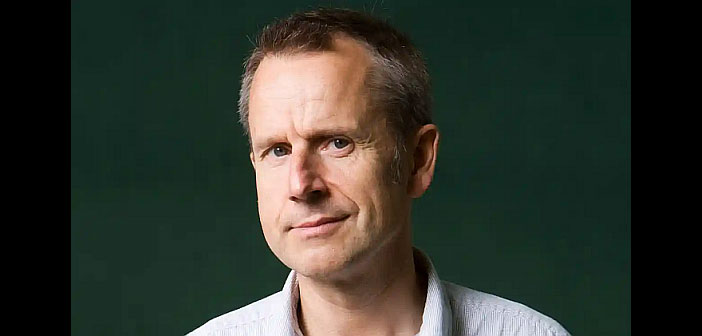Friends and family of Jeremy Hardy gathered to celebrate his life on Monday 13th May at the Battersea Arts Centre. This piece was published on Jeremy Hardy’s website.
They included Jeremy Corbyn, who spoke of a friendship stretching back to the the 1980s. “Jeremy was one who always gave his all to any campaign,” he said. He was followed by John McDonnell, who spoke of working with Jeremy on the campaigns to free the Birmingham Six and Guildford Four. “I loved the man,” he said, before explaining that he was then leaving early to continue Brexit negotiations with the government.
At times, Jeremy’s voice came recorded, from speakers. Another time, it came, breathtakingly, from Rory Bremner, with whom he once shared a house. “I used to live in Rory’s attic,” he said, in Jeremy’s voice. “That’s why he looks so young.” Harry Enfield played tribute in full Loadsamoney character, remembering Jeremy on Radio 4, which “is like TalkSport, but shit”. Julian Clary recalled him “being scathing about the Tories in a cardigan”.
Mark Steel spoke of being called by an obituarist after Jeremy died, and being asked, “was he political at all?” and his regret that he hadn’t retorted that Jeremy was the chairman of his local Conservative Association. Jack Dee, like many, recalled Jeremy’s mischief, and his habit of flicking ahead in the pages of flipcharts in rented conference suits, to leave, for the unwary, a sketch of a penis.
Former colleagues spoke in awe of his comic ability and delightful rage. Her favourite moments of the News Quiz, said Sandi Toksvig, was “when Jeremy went off on one, and I would take off my glasses and sit back, knowing that there were ten unbroadcastable minutes ahead of us”. He also, she revealed, heckled her at her own wedding, shouting out, “it should have been me!” According to Andy Hamilton, “it is an honour to be here, and it is also pretty inconvenient, which is what Jeremy would have wanted.” John Naismith, who produced Jeremy in I’m Sorry I Haven’t A Clue, made the room collapse simply by reading out some of Jeremy’s messages in his inbox.
Victoria Coren spoke of Jeremy’s friendship with her father, Alan, and of how he sourced a yarmulke for his funeral, and wore it, even though nobody else had one, because it was in a churchyard. Younger comics, such as Francesca Martinez and Seann Walsh spoke of his mentorship; of meeting him as fans and of him flatly refusing to accept that dynamic and turning them into friends instead. Jeremy’s sisters, Serena and Joy, described him as a child, with Jack Dee reading extracts of the already hilarious letters he was writing to them as a thirteen-yearold. “On Monday,” he wrote, “nothing happened.” There was music, including a haunting Shipbuilding from Charlotte Church and performances from Loinnir McAliskey and She Drew The Gun. Kathryn Williams performed a song called Prospero, written for Jeremy.
As ever, Jeremy’s comedy was intertwined with his constant, compassionate politics. Hugo Rifkind talked of his ability to transcend tribalism, as an antidote to the divisiveness of the Twitter age. “He perceived suffering,” explained Emma Thompson, “and was somehow unable to bear it.” Maxine Peak and Saffron Burrows spoke of all spoke of his activism, and its invigorating, contagious, empowering effect. Leila Sansour, with whom he made Jeremy Hardy vs The Israeli Army, spoke of his passion for Palestine. Juliet Stevenson urged the audience to be more like Jeremy was, introducing Jawad and Ahmad Amiri, two refugees from Afghanistan, whom Jeremy and his wife Katie Barlow helped and befriended. “I did not know Jeremy was famous,” said Jawad. “When I found out, he denied it.”
The day ended with Katie [Jeremy’s wife] herself, reading a letter to Jeremy, talking of the loss felt by her, and by Jeremy’s daughter Betty, and by the outpouring of public grief after his death. “You became Saint Jeremy,” said Katie. “I’d been living with a saint, albeit one that said ‘c***’ a lot.” There followed footage of their wedding, and of Betty’s, both in the weeks before Jeremy died.
There was all this, and much more. “There’s this very fashionable idea that when you die it’s supposed to be a celebration and joyous and everybody laughing,” Jeremy once said, “but I want people’s lives torn apart when I go. I want to be embalmed and brought out when we have guests.” His own passing has featured the first and second of these, if not the third. He lives on in the minds and hearts of those who loved him, who numbered hundreds in that hall, and millions everywhere else.
There is a BBC Radio 4 tribute to Jeremy Hardy on May 16 & 23. Details here.

